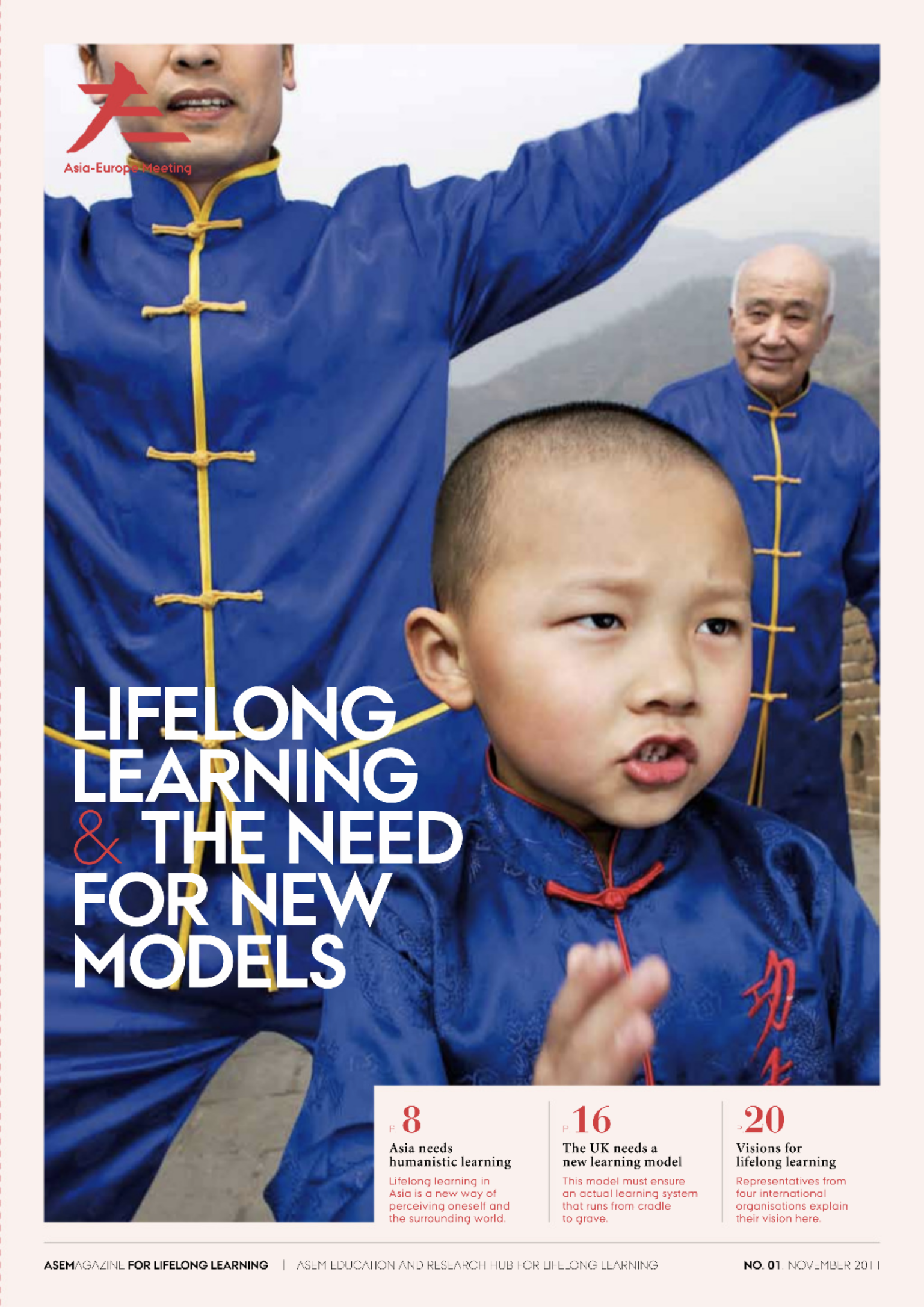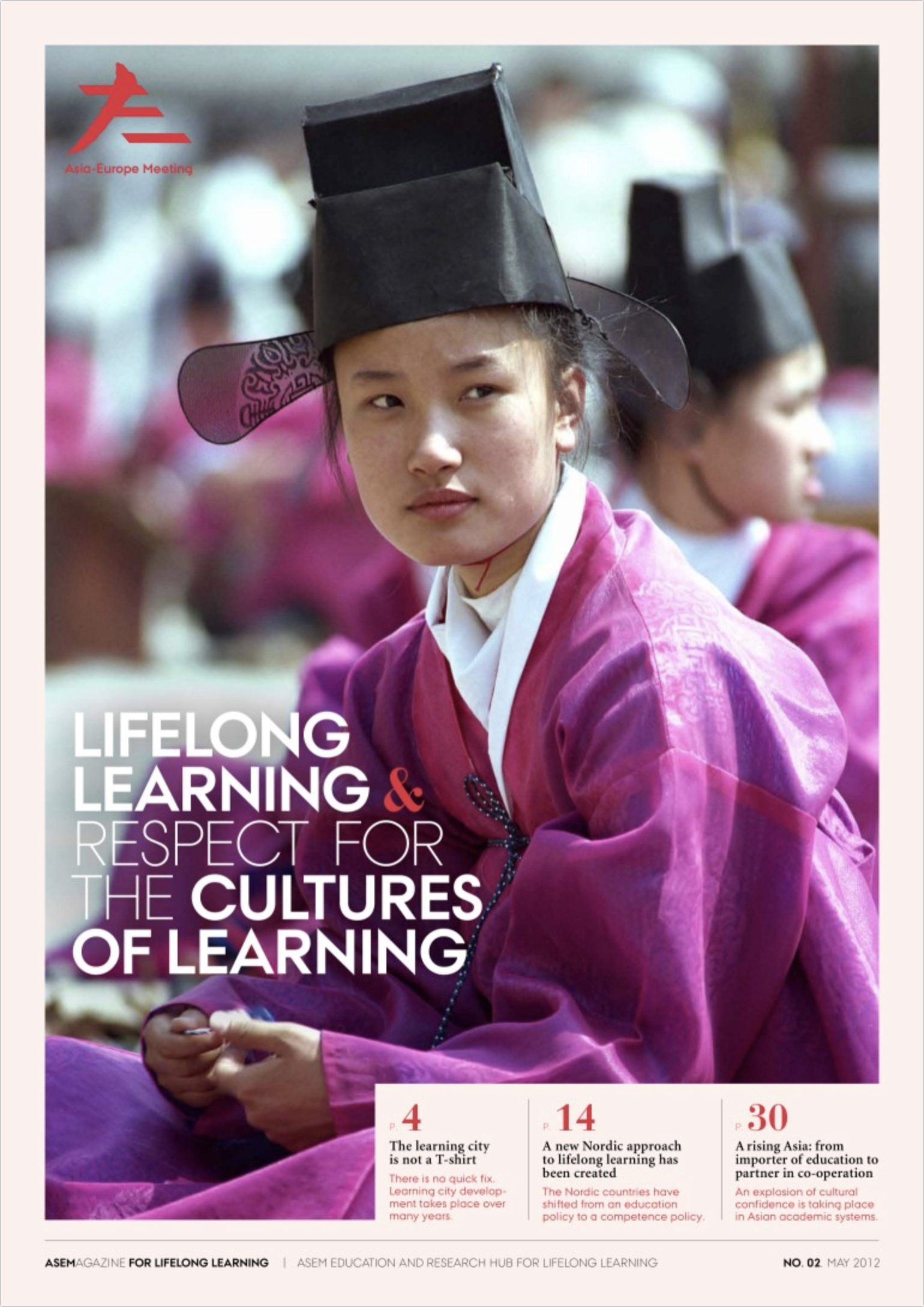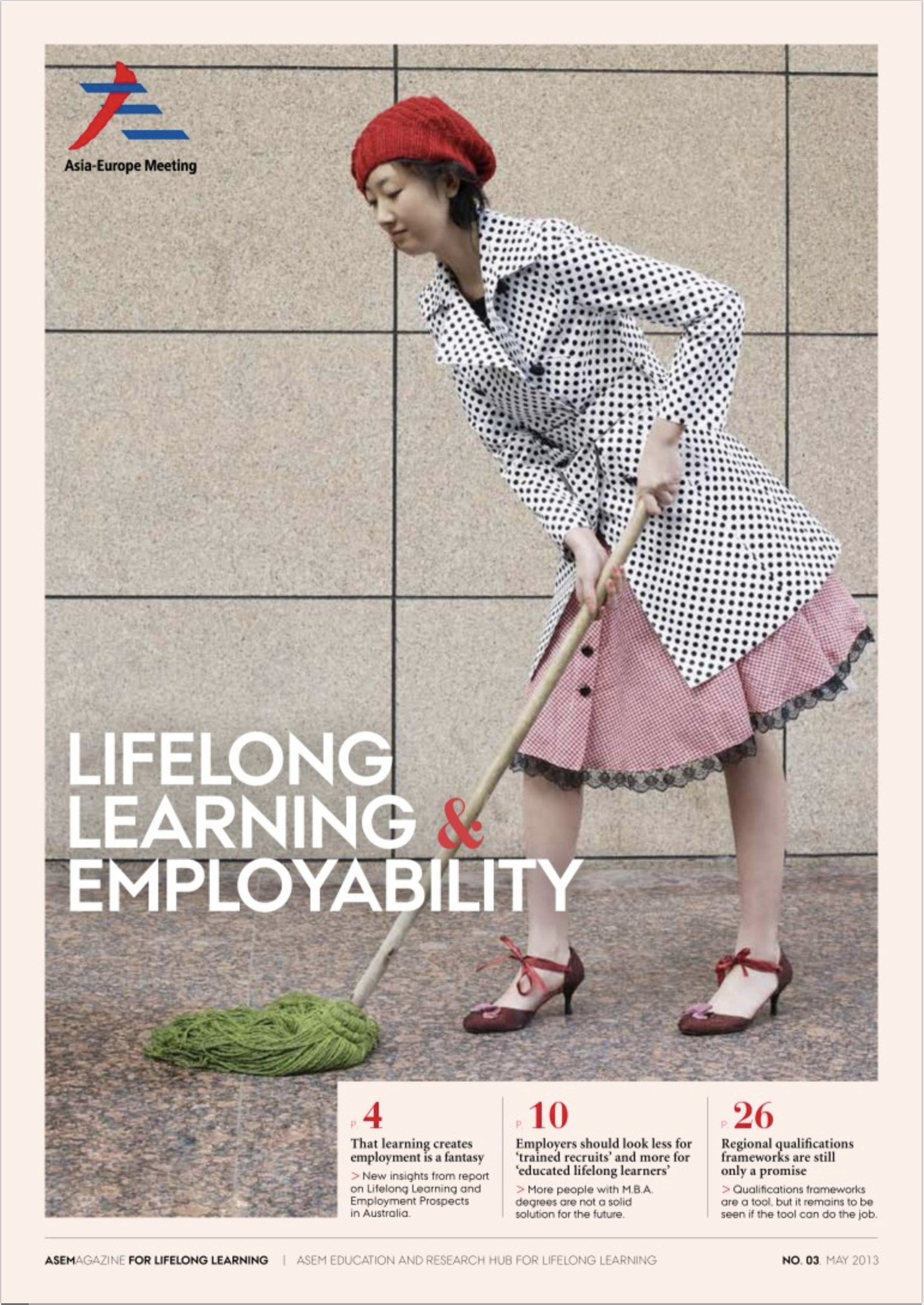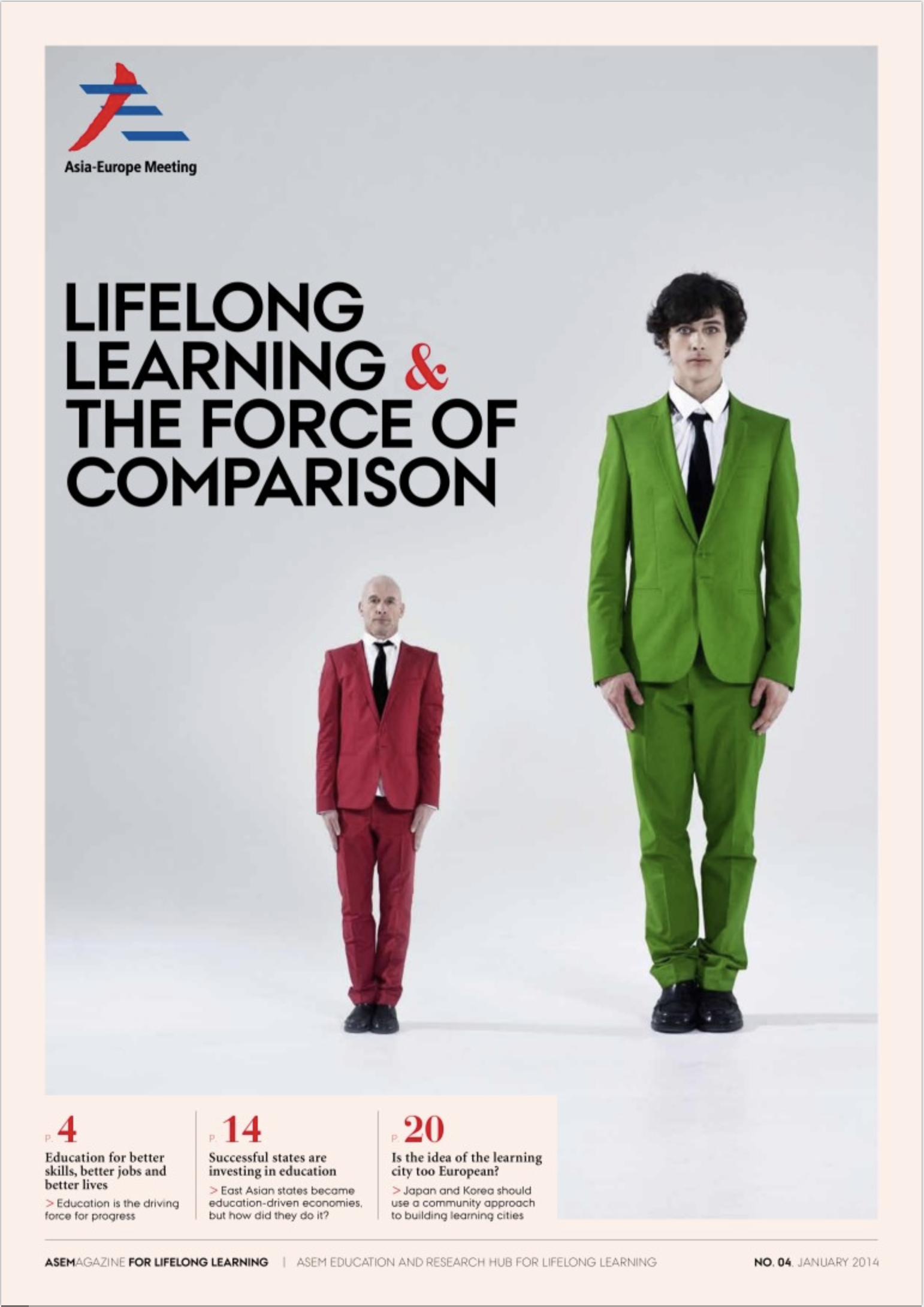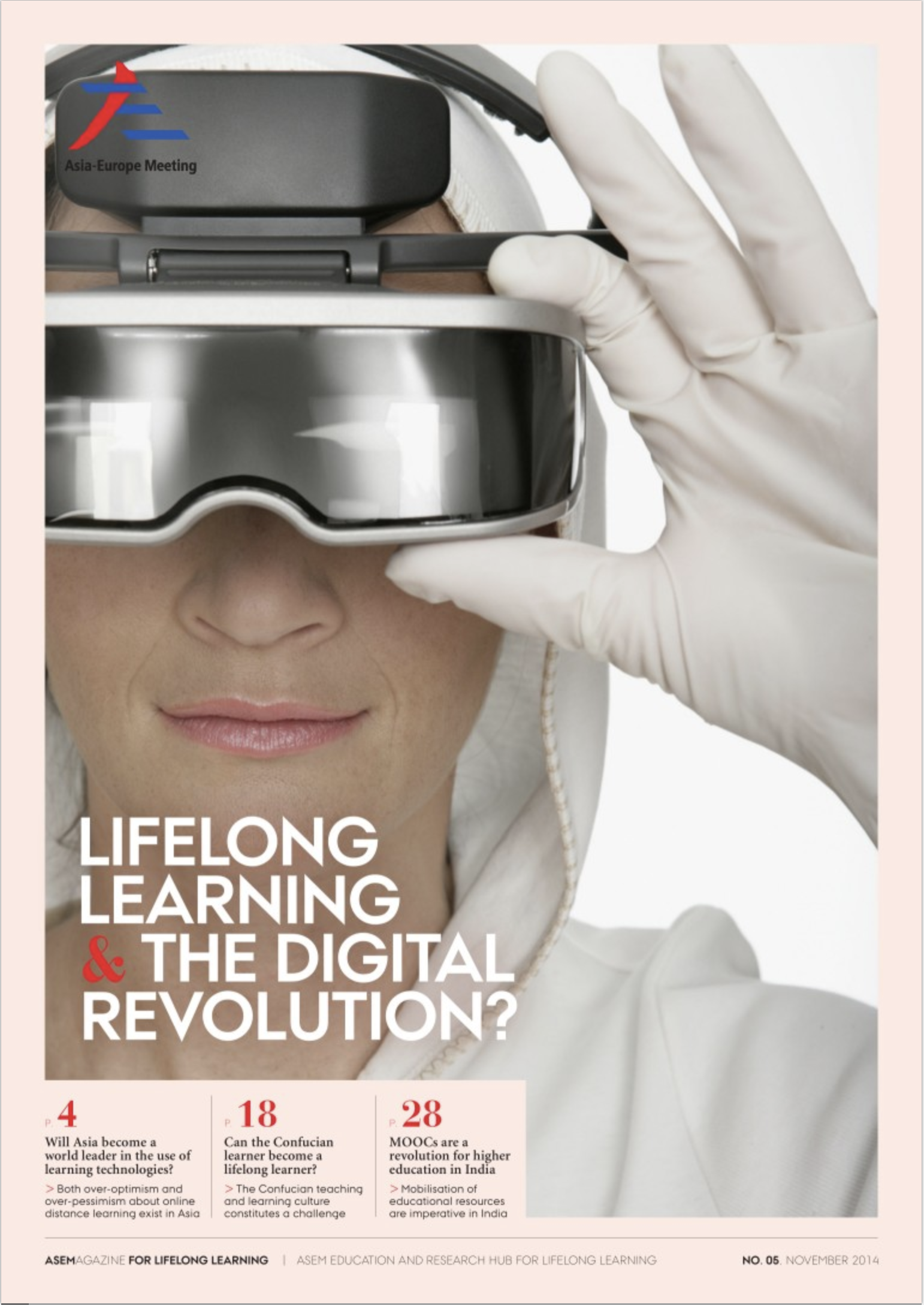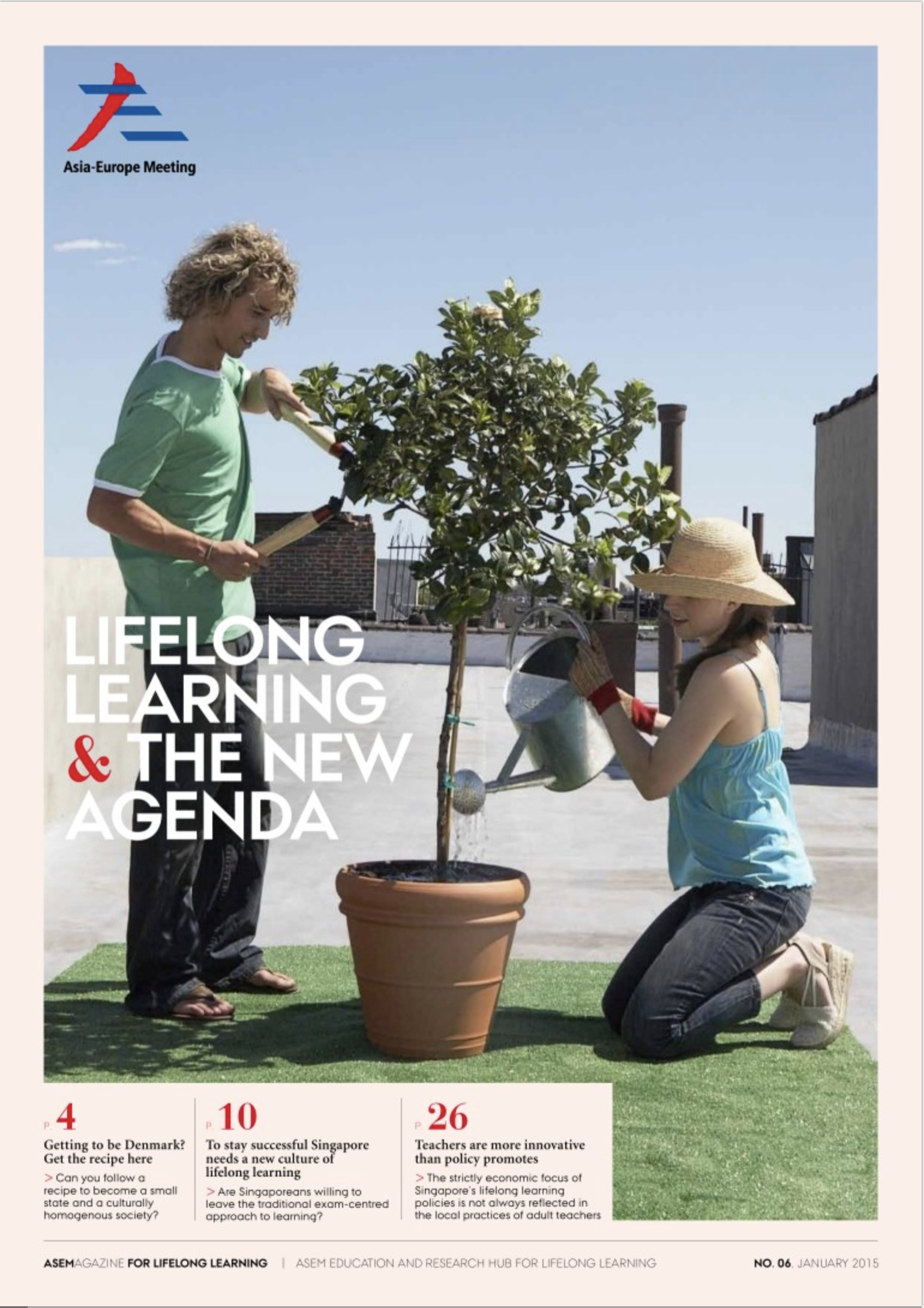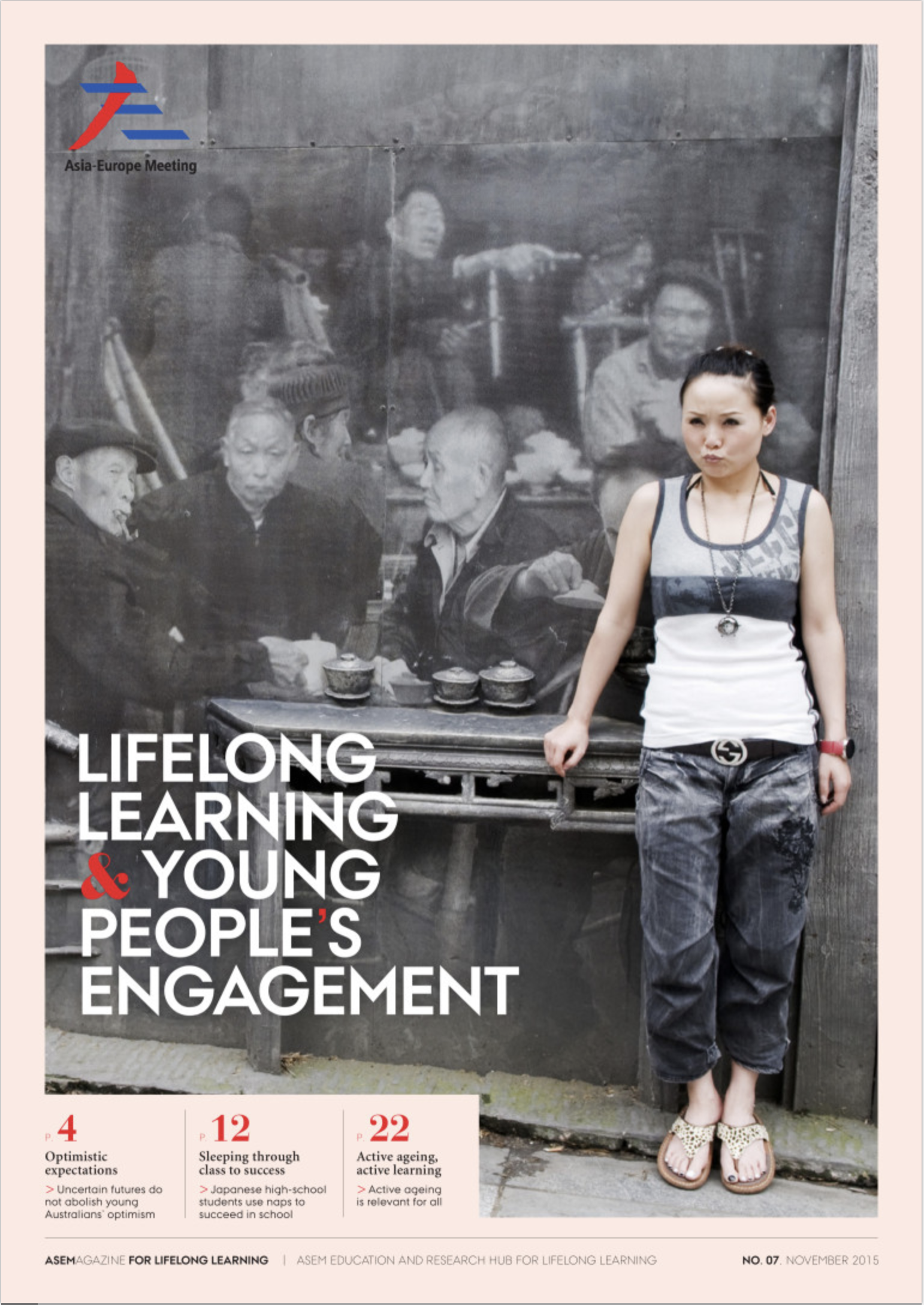ASEMagazines – Lifelong Learning &…
Dear Readers,
You are reading the ASEMagazine for Lifelong Learning.
The ASEMagazine for Lifelong Learning is a journalistic print and online magazine with articles on research in lifelong learning. The magazine was launched in November 2011 and is out two times a year. The magazine has been published by the Secretariat for ASEM LLL Hub at the Danish School of Education, Aarhus University.
The magazine has its sources in the research networks within the ASEM LLL Hub and its ambition is to disseminate research to a broad audience. Stated differently, the magazine is for all readers – politicians, researchers, citizens and practitioners – with an interest in lifelong learning. It will achieve this aim partly by proposing measures for politics and practice and partly by being informative and generating debate.
Through this magazine the ASEM LLL Hub Secretariat would like to make as great an effort as possible to communicate themes and topics in a manner that will help anyone interested benefit from recent research results within lifelong learning.
Please click on the cover images and enjoy reading!
Lifelong Learning and the Need for New Models
Dear Readers,
You are reading the first issue of the ASEMagazine for Lifelong Learning.
The magazine has its sources in the research networks within the ASEM LLL Hub and its ambition is to disseminate research to a broad audience. Stated differently, the magazine is for all readers – politicians, researchers, citizens and practitioners – with an interest in lifelong learning. It will achieve this aim partly by proposing measures for politics and practice and partly by being informative and generating debate.
Through this magazine the ASEM LLL Hub Secretariat would like to make as great an effort as possible to communicate themes and topics in a manner that will help anyone interested benefit from recent research results within lifelong learning.
Please click on the cover image and enjoy reading. To turn the pages please use the arrow icons or click on the bottom right corner of each page. You can also print a copy, share with your friends and bookmark the link by using the functions on the bottom menu bar.
Happy reading!
ASEM LLL Hub Secretariat
Copenhagen, November 2011
Lifelong Learning and Respect for the Cultures of Learning
Dear Readers,
You are reading the second issue of the ASEMagazine for Lifelong Learning which is released on the occasion of the ASEM Forum ‘LEARNING UNLIMITED’ in Copenhagen in May 2012.
The learning city is not a T-shirt
Today more than 1,000 cities in the world have become learning cities. However, the idea of becoming a learning city is not just a brand on a T-shirt. Professor Norman Longworth (UK) describes the situation of building learning cities in Asia and Europe.
The geopolitics of feelings
The west is wrapped in a thick blanket of fear and it is putting life on hold. While Europe is pessimistic and unambitious Asia is booming and full of hope. The consequences are enormous and if Europeans do not regain hope, ‘brain drain’ will soon equal intelligentsias exodus from the West. This is the analysis of the canny French political scientist Dominique Moïsi.
A new Nordic approach to lifelong learning has been created
A new report from the Nordic Council of Ministers confirms a shift from an education policy to a competence policy in the Nordic countries. “The reason for this is that Nordic countries have realized that they must transform from being welfare states to successful competitive states in the global market,” says researcher – and co-author of the report – Søren Ehlers.
Please click on the cover image and enjoy reading. To turn the pages please use the arrow icons or click on the bottom right corner of each page. You can also print a copy, share with your friends and bookmark the link by using the functions on the bottom menu bar.
Happy reading!
ASEM LLL Hub Secretariat
Copenhagen, May 2012
Lifelong Learning and Employability
Dear Readers,
You are reading the third issue of the ASEMagazine for Lifelong Learning which focuses on lifelong learning and employment prospects.
In the article “That learning creates employment is a fantasy” featuring the Australian case, Professor Allie Clemans of Monash University noted that learning and its relationship to employment opportunities has had a tendency to be converted to a notion of ’employability’ which puts the onus on preparation for employment on the individual. However, it is not just individual motivation alone that generates employment or creates job, she argues. Hence, lifelong learning policies should address the multiple realities and nuances of life chances and life changes. A new set of alternatives principles is needed for the sake of making the market work better.
In the article “The pay-offs of lifelong learning”, Professor Karen Evans of the Institute of Education in London informs us that lifelong learning influences life chances and has significant protective effects by keeping adults close to a changing labour market. Furthermore, increasing inequalities in participation in adult learning go hand in hand with rising levels of household income inequality.
The “Youth employment crisis in Europe and Asia” article features the situation and different solutions for this burning issue in the two continents. The Magazine also introduces new sections on Book review and Policy review to create a space for ASEM researchers to share their analysis and evaluation on the quality, meaning and significance of publications or policies in the field of lifelong learning.
Please click on the cover image and enjoy reading. To turn the pages please use the arrow icons or click on the bottom right corner of each page. You can print a copy in .pdf format, share with your friends and bookmark the link by using the functions on the bottom menu bar.
You can also access the magazine on the Facebook page of ASEM LLL Hub.
Happy reading!
Que Anh Dang
ASEM LLL Hub Secretariat
Copenhagen, May 2013
Book Review
Fejes, A. and Nicoll, K. (eds) (2008) Foucault and Lifelong Learning: Governing the subject.
Reviewed by: Professor Zenaida Q. Reyes, PhD, Philippine Normal University, Manila, Philippines.
ASEM LLL Hub Research Network 4 on ‘National Strategies and Policies for Lifelong Learning’.
The arguments of the book’s contributors revolve around the construct of governmentality and its application to educational policies, educational practices and learners. These are articulated in three focused questions:
• What are the effects of lifelong learning policies within socio-political systems of governance?
• What does lifelong learning do to our understanding of ourselves as citizens?
• How does lifelong learning act in the regulation and reordering of what people do?
The book review was shortened in the ASEMagazine for Lifelong Learning due to the limited space of the printed version. Please read the full version here.
Lifelong Learning and the Force of Comparison
Dear Readers,
You are reading the fourth issue of the ASEMagazine for Lifelong Learning which focuses on lifelong learning and the comparison of education.
In the article “Education for better skills, better jobs and better lives”, the Deputy Director for Education and Skills and Special Advisor on Education Policy to the OECD’s Secretary General, Andreas Schleicher states that there is no shortcut to equipping people with the right skills and to providing people with the right opportunities to use their skills effectively. Furthermore, he maintains that if there’s one lesson the global economy has taught policymakers over the last few years, it is that we cannot simply bail ourselves out of a crisis, that we cannot solely stimulate ourselves out of a crisis and that we cannot “just print money” our way out of a crisis. Instead, in today’s world economy, education and skills are the driving forces for progress.
In the article “Successful states are investing in education”, Professor Andy Green from the Institute of Education, University of London compares not only the importance of education for the formation of the Western states in the 19th century, but also compares the educational significance of education in the formation of the East Asian states. A main conclusion is that if a state wants greater growth rates than other countries, then it must invest in education.
Professor SoongHee Han from Seoul National University and Professor Atsushi Makino from University of Tokyo give an Asian view on learning cities in the article “Is the idea of the learning city too European?”. In their view, the differences between the two continents of Asia and Europe, in this sense of learning cities, need to be mutually respected and explained with different theoretical models. The two professors believe that the distinctive features of the Asian type of learning city can be characterised as a community relations model, in contrast to European learning cities which are basically built on the belief that learning is an individual process and learning city programmes aim to enhance individual competency.
Please click on the cover image and enjoy reading. To turn the pages please use the arrow icons or click on the bottom right corner of each page. You can read/print a copy in .pdf format, share with your friends and bookmark the link by using the functions on the bottom menu bar.
You can also access the magazine on the Facebook page of ASEM LLL Hub.
Happy reading!
Anders Martinsen
ASEM LLL Hub Secretariat
Copenhagen, January 2014
Lifelong Learning and the Digital Revolution?
Dear Readers,
You are reading the fifth issue of the ASEMagazine for Lifelong Learning which focuses on lifelong learning and the digital revolution.
Online distance learning in Asia is associated with the view that the use of learning technologies will miraculously bring about a learning society. However, in the article “Will Asia become a world leader in the use of learning technologies?”, Dr Insung Jung from the International Christian University in Tokyo, Japan, and Dr Min Yang from the Faculty of Education and Human Development, Hong Kong, questions how effective the technologies are used. The article also shows that both over-optimism and over-pessismism about online distance learning exist in Asia.
In the article “Can the Confucian learner become a lifelong learner?”, Professor David Carless from the Faculty of Education, University of Hong Kong and Emeritus Professor David Boud from University of Technologies, Sydney and Director of the Research Centre in Assessment and Digital Learning, Deakin University describes the challenges for the Confucian teaching and learning cultures. A succesful lifelong learner has ‘learning how to learn’ skills, but this requires a learning culture that appreciates self-assessment.
In the view of Professor Karanam Pushpanadham from Faculty of Education and Pshychology, the M.S. University of Baroda, India, students from middle and higher income groups in India are migrating from the country at an alarming rate to get higher education degrees. In the article “MOOCs are a revolution for higher education in India” he states that if India is to avoid this the mobilisation of educational resources is imperative.
Please click on the cover image and enjoy reading. To turn the pages please use the arrow icons or click on the bottom right corner of each page. You can read/print a copy in .pdf format, share with your friends and bookmark the link by using the functions on the bottom menu bar.
You can also access the magazine on the Facebook page of ASEM LLL Hub.
Happy reading!
Anders Martinsen
ASEM LLL Hub Secretariat
Copenhagen, November 2014
Lifelong Learning and the New Agenda
Dear Readers,
You are reading the sixth issue of the ASEMagazine for Lifelong Learning which focuses on lifelong learning and the new agenda.
In the article “Getting to be Denmark? Get the recipe here!”, Associate Professor Claus Holm, Ph.D. and Acting Head of Department of Education, Aarhus University, Denmark discuss what Francis Fukuyama has described as ‘Getting to be Denmark’ – a country with good political and economic institutions: stable, democratic, peaceful, prosperous, inclusive and low political corruption. It does not seem very plausible that contemporary developing – or any other – countries could become like Denmark. So is there not a recipe for how to become like Denmark that works in the year 2015?
According to Principal Research Fellow and Head of Centre for Research in Work and Learning at the Institute for Adult Learning in Singapore, Helen Bound new research shows that the strictly economic focus of Singapore’s lifelong learning policies is not always reflected in the local practices of adult education. In the article “Teachers are more innovative than policy promotes” she tells that teachers have a much more humanistic orientation.
In the article “To stay successful Singapore needs a new culture of lifelong learning” by Associate Professor Søren Christensen from Aarhus University it is described how Singapore needs to develop students who can think critically. The question is then whether Singaporeans are willing to leave the traditional exam-centred approach to learning?
This magazine is also a supplement for our upcoming ASEM Forum on Lifelong Learning – ‘Renewing the Agenda for Lifelong Learning’. You can see the programme and sign up here.
Happy reading!
Anders Martinsen
ASEM LLL Hub Secretariat
Copenhagen, January 2015
Lifelong Learning and Young People’s Engagement
Dear Readers,
You are reading the seventh issue of the ASEMagazine for Lifelong Learning which focuses on lifelong learning and young people’s engagement.
Young Australians’ post-school futures are uncertain, insecure and fluid in relation to working life. But if you think that this is the recipe for a next generation of depressed young Australians, you may be wrong – this is the claim from Associate Professor Lucas Walsh from the Faculty of Education at Monash University in his article “Optimistic expectations”.
In the article “Big trouble with smooth transitions”, Senior Analyst Stéphanie Jamet from OECD describes how the cost of the difficulties faced by young people in their transitions is perhaps not sufficiently considered by governments. OECD countries have trouble achieving a smmoth transition.
In the view of Senior Lecturer Brigitte Steger from University of Cambridge we are not as good at taking naps as in Europe. Sounds strange – get the answer in the article “Sleeping through class to success”.
The article “Active ageing, active learning” by David Istance from OECD underlines the importance of lifelong learning. Learning is a crucial ingredient of staying active.
Please click on the cover image and enjoy reading. To turn the pages please use the arrow icons or click on the bottom right corner of each page. You can read/print a copy in .pdf format, share with your friends and bookmark the link by using the functions on the bottom menu bar.
You can also access the magazine on the Facebook page of ASEM LLL Hub.
Happy reading!
Anders Martinsen
ASEM LLL Hub Secretariat
Copenhagen, November 2015



